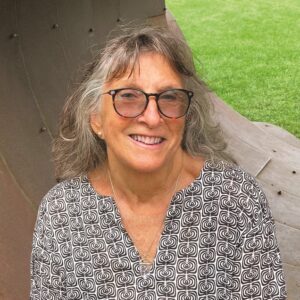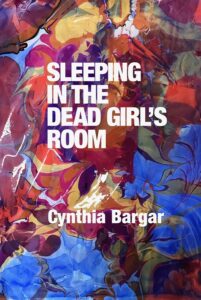Cynthia Bargar was writing short fiction when her friend, the poet Michael Burkard, urged her to turn toward poetry. “He would read my stories,” says Bargar, “and say, ‘Why aren’t you writing poems?’ ” To which Bargar would reply, “I don’t know how to write a poem.”

Then, at a revelatory memoir-writing workshop with Brian Turner at the Fine Arts Work Center in 2016, what started off as an enjoyable toe-dip into poetry became a passion, she says. It was then that she began writing the pieces that would become her memoir in poems, Sleeping in the Dead Girl’s Room (Lily Poetry Review Books, 2022).
While many of the poems in the collection are set in Winthrop, where Bargar is from, she wrote them in Provincetown, where she has lived since 2019. It has been longlisted for the 2023 Massachusetts Book Award in Poetry by the Massachusetts Center for the Book.
Following the Jewish tradition of naming children after deceased relatives, Cynthia May Bargar carries the same first, middle, and last names as an aunt who died by suicide months before Bargar was born. The volume grapples with what it means to exist as an individual when one’s identity is enmeshed with a ghost’s.
Bargar’s poetry also unwaveringly investigates her own struggles with manic depression exacerbated by a monthlong stay at the now-defunct Glenside Psychiatric Hospital in Jamaica Plain in the 1970s. It was only when she began to write about her experience at Glenside — an exercise that included reviewing a massive stack of her own medical records — that Bargar’s namesake began to appear in her poetry.

Her aunt’s life and death had rarely been mentioned during Bargar’s childhood, she says: “I hadn’t really thought about her that much in my conscious mind.” But during her time at Glenside, Bargar says, “I had a visitation from her.”
Throughout the collection, the distinction between past and present, between the aunt-Cynthia and the poet-Cynthia blurs: “When they call my name they are calling hers,” the poem “Cynthia” begins.
The blurriness of Bargar’s own identity comes through in the poetic form itself as she slides together the pronouns you, I, and she when referring to herself and her aunt. She also splits up words and sentences with an array of em-dashes, slashes, and strokes of white space to capture, she says, “the idea that things aren’t straight,” and that the story she is telling is “not one narrative, necessarily.” These devices helped her say what seemed unsayable: “It’s like music,” she says.
The narrative often pits pain against erasure. In “Water Cure,” Bargar interweaves language from the American Journal of Insanity — the name, from its founding in 1844 to 1921, of what is now called the American Journal of Psychiatry — with her own pleas for help at Glenside. “Gas Kills Girl in Winthrop” uses erasure, also known as blackout poetry, over an image of the newspaper announcement of her aunt’s death. And in “Presumably” she places her own words over an image of her aunt’s death certificate.
What poet and reader are left with are, in one way, unfillable gaps in the archive. “Nobody knows anything, and I don’t know anything,” Bargar says. “It’s poetry. That’s all it is.”
Yet the poems turn the reader toward the ways we are all haunted by our ancestors, whose losses are lodged in our bones, and toward the possibility that healing lies in unburying their stories.



